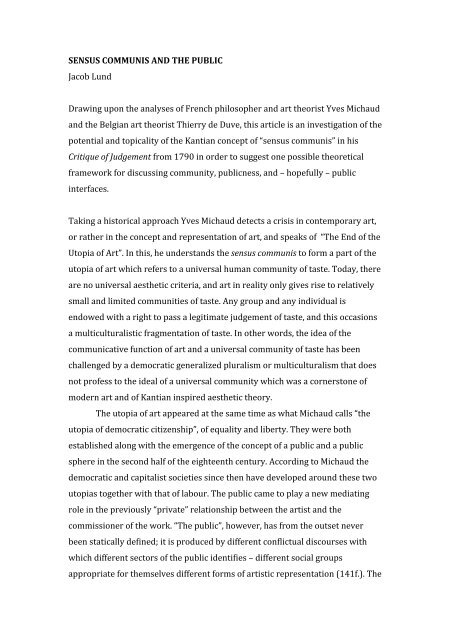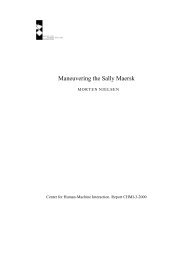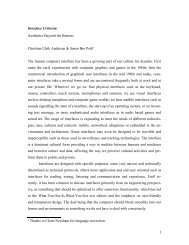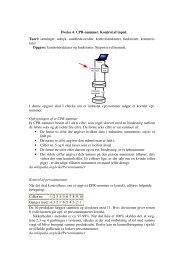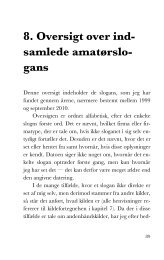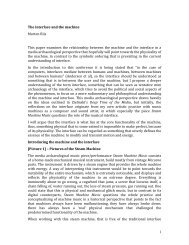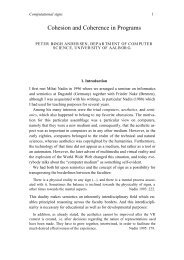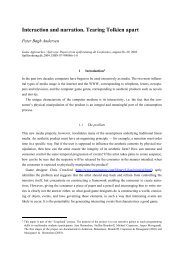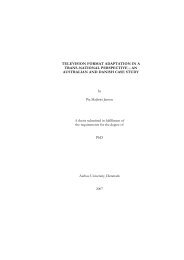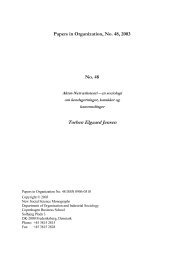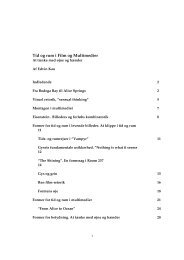SENSUS COMMUNIS AND THE PUBLIC Jacob Lund Drawing upon ...
SENSUS COMMUNIS AND THE PUBLIC Jacob Lund Drawing upon ...
SENSUS COMMUNIS AND THE PUBLIC Jacob Lund Drawing upon ...
Create successful ePaper yourself
Turn your PDF publications into a flip-book with our unique Google optimized e-Paper software.
<strong>SENSUS</strong> <strong>COMMUNIS</strong> <strong>AND</strong> <strong>THE</strong> <strong>PUBLIC</strong> <br />
<strong>Jacob</strong> <strong>Lund</strong> <br />
<strong>Drawing</strong> <strong>upon</strong> the analyses of French philosopher and art theorist Yves Michaud <br />
and the Belgian art theorist Thierry de Duve, this article is an investigation of the <br />
potential and topicality of the Kantian concept of “sensus communis” in his <br />
Critique of Judgement from 1790 in order to suggest one possible theoretical <br />
framework for discussing community, publicness, and – hopefully – public <br />
interfaces. <br />
Taking a historical approach Yves Michaud detects a crisis in contemporary art, <br />
or rather in the concept and representation of art, and speaks of “The End of the <br />
Utopia of Art”. In this, he understands the sensus communis to form a part of the <br />
utopia of art which refers to a universal human community of taste. Today, there <br />
are no universal aesthetic criteria, and art in reality only gives rise to relatively <br />
small and limited communities of taste. Any group and any individual is <br />
endowed with a right to pass a legitimate judgement of taste, and this occasions <br />
a multiculturalistic fragmentation of taste. In other words, the idea of the <br />
communicative function of art and a universal community of taste has been <br />
challenged by a democratic generalized pluralism or multiculturalism that does <br />
not profess to the ideal of a universal community which was a cornerstone of <br />
modern art and of Kantian inspired aesthetic theory. <br />
The utopia of art appeared at the same time as what Michaud calls “the <br />
utopia of democratic citizenship”, of equality and liberty. They were both <br />
established along with the emergence of the concept of a public and a public <br />
sphere in the second half of the eighteenth century. According to Michaud the <br />
democratic and capitalist societies since then have developed around these two <br />
utopias together with that of labour. The public came to play a new mediating <br />
role in the previously “private” relationship between the artist and the <br />
commissioner of the work. “The public”, however, has from the outset never <br />
been statically defined; it is produced by different conflictual discourses with <br />
which different sectors of the public identifies – different social groups <br />
appropriate for themselves different forms of artistic representation (141f.). The
aesthetic question of criteria of taste arised because of the plurality of the <br />
public’s judgements of taste and the confrontations of these in the public sphere. <br />
Kant’s Critique of Judgement is a response to this question in that it seeks <br />
to provide rational foundation for those types of universal claims arising from <br />
aesthetic judgements. What is communicated in the judgement of taste is, in <br />
Kant’s own words, “the mental state in which we are when imagination and <br />
understanding are in free play”. What is actually communicated is the <br />
communicability of feeling, so to speak, that is, the effect the free play of the <br />
faculties of cognition – of understanding and imagination – has on the mind. <br />
Aesthetic communication is the universal communicability of a feeling we all <br />
know through the very nature and free play of our faculties. It is, in other words, <br />
a process in which everyone participates, an inter-‐subjective community. <br />
Michaud’s aim is to draw out the implications of Kant’s theory for what he refers <br />
to as the utopia of art. <br />
The Critique of Judgement addresses in particular the question of <br />
communication and intersubjectivity: The passing of a judgement of taste is an <br />
aesthetic act, in which the person affirming the universality of his or her <br />
sentiment goes beyond his or her ego and merges with others. It is a passage <br />
from “I” to ”we”. According to Michaud this intersubjectivity should not be given <br />
an ahistorical character, but should instead be seen in its historical context, <br />
namely the French revolution and the idea of freedom and equality amongst the <br />
citizens: The formal universality of judgements of taste and the social <br />
communication that supported them not only anticipated the coming equality <br />
which was the actual future of the utopia of democratic citizenship, it actually <br />
participated in its realisation: “The utopia of art is a correlate of citizen-‐based <br />
utopia. This utopia of art is a utopia of possible communication, a utopia of <br />
‘cultural communism,’ or at any rate of the cultural community. The world is not <br />
irremediably split between the most civilized and the most uncultivated <br />
precisely because there exists this formal universality of judgments of taste.” <br />
(146).
Thus, the judgement of taste signifies that the world is shared, a common, <br />
and aesthetic experience reinforces the equality of citizens postulated elsewhere. <br />
The program of Kant and the early aesthetic thinkers was a democratic program. <br />
This utopia of art has now come to an end, Michaud claims. Kant formulated his <br />
program in the context of the utopia of citizenship by giving the concept and the <br />
reality of a public sphere of communication around artworks a theoretical form <br />
and a rational foundation (149). Kant was not very concerned with the artworks <br />
in themselves; the most important was the establishment of communication in <br />
the aesthetic experience. Aesthetic experience should not be reserved for an elite <br />
of refined connoisseurs leaving the lower classes to their uncivilized crudeness, <br />
excluded at the same time from political freedom and equality. The utopia of art <br />
is a utopia of communication, democracy and civilization: it is integrated in the <br />
program of an education (Bildung) of humanity into sociability (ibid.). <br />
But, according to Michaud, already in the nineteenth century the utopia of <br />
communication turned out to be an illusion. Under the influence of capitalist and <br />
democratic development the enlightened and public critical sphere of the <br />
eighteenth century became the sphere of public opinion as well as of the division <br />
between classes and social groups (151). Even though art appeared to provide <br />
the principle of aesthetic communication, in reality no one agrees. Everyone is <br />
sure of the universal relevance of his or her experience, but no one is able to <br />
convince any one else when they disagree. In reality the Salon exploded into a <br />
series of competing salons, and the aesthetic community is characterised rather <br />
by disagreement. It turns out to be a myth, Michaud claims. Despite different <br />
attempts to obstruct the reality of this disillusionment, utopia is truly dead. <br />
According to Michaud art stands for a motive for believing in sympathy and <br />
communication, that is, in the Kantian sense, in a principle of sociability and <br />
community that is not based on religion, the nation, national language, family, <br />
commercial interests etc. But the community cannot be founded on such an <br />
imaginary principle: <br />
Art continues to be presented as a source of legitimation and motivation <br />
able to reenchant social life – but it is merely a mirage. One can imagine the <br />
importance of being attentive to other more modest and less lofty forms of
legitimation and motivation. The crisis of art raises the issue of new <br />
concepts which have to be formed in order to think through radical <br />
democracy. (156) <br />
Contrary to Michaud Thierry de Duve defends – in a more analytical approach – <br />
the belief in or principal hope for a sensus communis even though it only exists <br />
as an idea, or a presupposition. When passing an aesthetic judgement, for <br />
example “This rose is beautiful,” or “This urinal is art,” or “This code is art,” we <br />
say “you ought to feel the way I feel, you ought to agree with me”. According to <br />
de Duve Kant understood better than anyone else that this call on the other’s <br />
capacity for agreeing by dint of feeling is legitimate. Thus, the faculty of taste is <br />
only important in so far as it testifies to a universally shared faculty of agreeing, <br />
namely sensus communis – it is not important in itself. (“Do Artists”, 141). <br />
De Duve sees sensus communis as a kind of cosmopolitanism that is not <br />
founded politically, but aesthetically. Therefore it would be illegitimate to <br />
actually found the cosmopolitan state <strong>upon</strong> it, “because an actual aesthetic <br />
community extending to all world would be a monster.” (“The Glocal”, 685). For <br />
the existence of sensus communis as a fact cannot be proven, and civil society <br />
cannot be be constructed on the basis of the faculty of agreeing. The only actually <br />
existing fact is that we pass aesthetic judgements and that we do this by dint of <br />
feeling, and that we, at least implicitly, claim universal assent for these feelings. <br />
To Kant it does not matter whether taste actually is the faculty of agreeing of all <br />
humans, or whether taste merely signals this faculty. The decisive point for de <br />
Duve is that regardless of whether sensus communis exists as a fact, we ought to <br />
suppose that it does. <br />
History has taught us to think that sensus communis is definitely not a <br />
natural endowment of humankind and therefore must be a mere regulative idea: <br />
we have realised the “fact” that we do not possess the faculty of spontaneously <br />
empathizing with the human in us all. The name of the demonstration of this lack <br />
of empathy with the human in us all as a “fact” is Auschwitz (On Negativity). But, <br />
the fact that sensus communis is not a fact is only a fact in the empirical, verifiable <br />
sense, de Duve remarks. What we must not do, de Duve contends, is to conflate <br />
and confound Auschwitz as a fact of reason and Auschwitz as a fact of nature.
The empirical fact of nature is that Auschwitz did take place. The fact of reason is <br />
that Auschwitz ought never to have happened – “Auschwitz never again,” the <br />
moral law reads. This is the reasoning behind de Duve’s claim that sensus <br />
communis does not exist, but it ought to exist. <br />
According to de Duve sensus communis refers to a faculty of global <br />
empathy, and in spite of his profound pessimism regarding human nature, Kant <br />
saw that we cannot renounce the idea, the undemonstrated postulate, that we <br />
humans are endowed with sensus communis without renouncing our own <br />
humanity, and that aesthetic judgements are the place where we automatically <br />
make this postulate. This small hope is the only one, Kant is ready grants us – <br />
“and it is not much compared with the promises made by the many utopias born <br />
out of the Enlightenment,” de Duve remarks (“The glimpse”, 7). In Kant the hope <br />
stems from the fact that human beings are inclined to see beauty in nature. In de <br />
Duve natural beauty is replaced by art: “We need art in order to retain that <br />
glimpse of hope that religion or politics can no longer promise, let alone <br />
guarantee.” (ibid., 8). <br />
The question that is still begging to be answered in this context is whether it is <br />
still possible – and advisable – to argue for some kind of shared feeling and <br />
community in our present state of affairs, i.e. in a late capitalist biopolitical <br />
society of control? And if it is: Which works and interfaces are able to provoke <br />
and facilitate such a sensus communis?
Works cited: <br />
de Duve, Thierry. “Do Artists Speak on Behalf of All of Us?” Diarmuid Costello and <br />
Dominic Willsdon, eds. The Life and Death of Images. Ithaca, NY: Cornell UP, <br />
2008. 139-‐156: 141. Print. <br />
de Duve, Thierry. “The Glocal and the Singuniversal: Reflections on Art and <br />
Culture in the Global World.” Third Text 21:6 (2007). 681-‐688: 685. Print. <br />
de Duve, Thierry. On Negativity in Kant’s Third Critique. Lecture given at the <br />
annual conference of The European Society for Aesthetics in Udine, Italy, May 29, <br />
2010. <br />
de Duve, Thierry and <strong>Lund</strong>, <strong>Jacob</strong>. “‘The Glimpse of Hope that Religion or Politics <br />
can no Longer Promise...’ An Interview with Thierry de Duve”. The Nordic Journal <br />
of Aesthetics. 36-‐37 (2008-‐2009). 6-‐10: 7. Print. <br />
Michaud, Yves. “The End of the Utopia of Art”. Bartomeu Mari and Jean-‐Marie <br />
Schaeffer, eds. Think Art: Theory and Practice in the Art of Today. Rotterdam: <br />
Witte de With, 1999: 131-‐156. Print.


